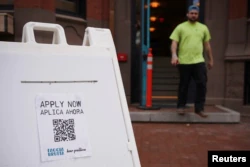The U.S. economy unexpectedly shrank 1.4% in the first three months of 2022 compared to a year ago, the government reported Thursday, raising fears that the world’s largest economy could face a recession.
After more than a year of rapid growth as the United States recovered from the initial ravages of the coronavirus, the American economy was buffeted in the January-to-March period by the fastest increase in consumer prices in four decades, the new wave of coronavirus omicron variant cases and Russia’s invasion of Ukraine.
The slowdown is the first since the coronavirus recession ended in April 2020, a period when millions of workers were laid off and many businesses shut their doors or sharply curtailed their operations.
Most U.S. economists in the U.S., however, believe the U.S. economy is resilient and project that it could resume modest growth in the April-to-June period, although some analysts are suggesting that a recession — two straight quarters of a receding economy — cannot be ruled out.
Still, hundreds of thousands of jobs are routinely being added to the economy month after month and March’s 3.6% unemployment rate was just a tick above the 3.5%, 50-year-low recorded just before the debilitating pandemic swept into the country.
But the first-quarter decline reported by the Bureau of Economic Analysis was in marked contrast to the 5.7% growth reported for last year, the fastest full-year advance since 1984, and the 6.9% annualized growth rate in the fourth quarter last year.
Economic analysts said the first-quarter decline was caused in part by a widening trade deficit, meaning that the U.S. imported far more goods than it exported. Businesses rapidly built up their inventories in the latter part of 2021 but slowed the pace in early 2022. Government aid to combat the effects of the coronavirus and boost the economy has now largely ended as well.
While job growth has been robust and the unemployment rate steadily dipped, most U.S. consumers are worried about inflation, especially with higher food costs and gasoline prices at service stations pinching family budgets. Year over year, consumer prices were up 8.5% in March, a 40-year high.
Policymakers at the country’s central bank, the Federal Reserve, have embarked on what they have signaled will be a series of increases in the coming months in their benchmark interest rate to tame inflation.
The expectation is that the Fed’s interest rate increase will push borrowing costs higher for both businesses and consumers, cooling too-rapid growth of the economy.

